|
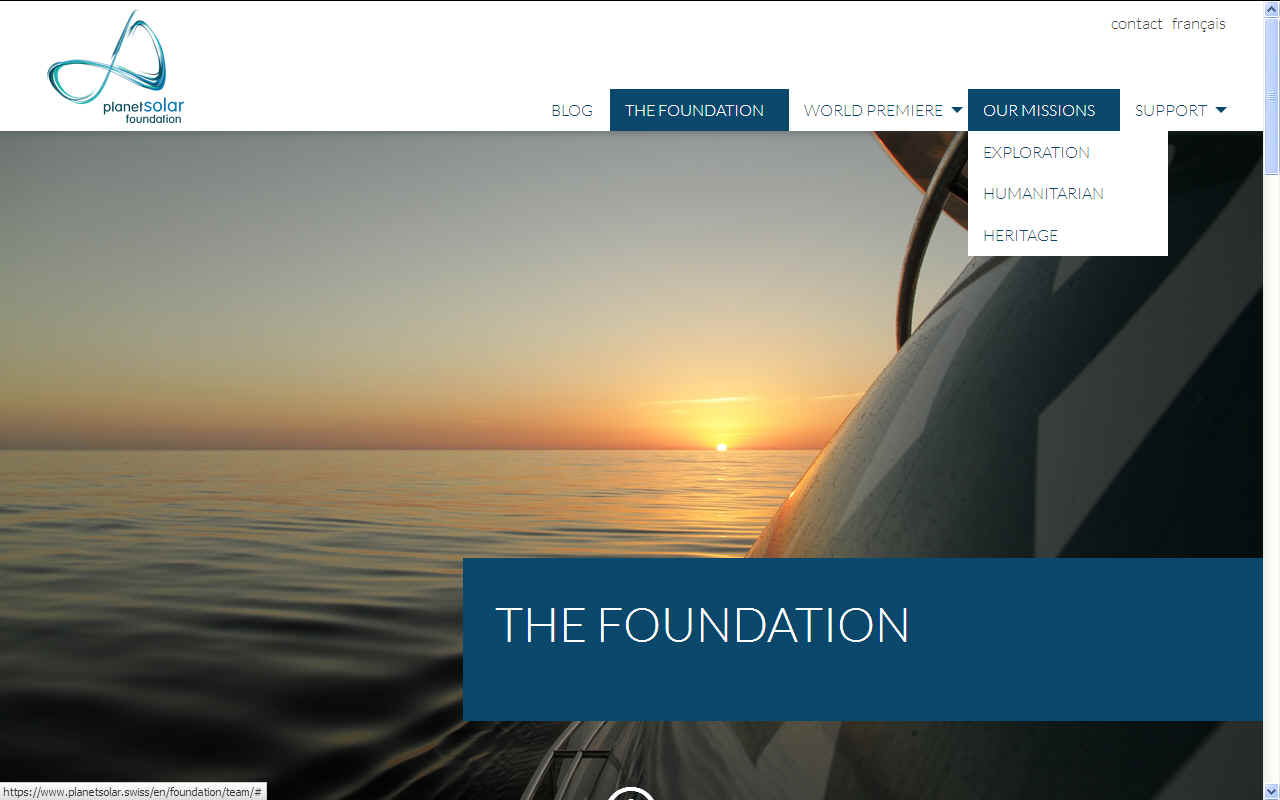
The
PlanetSolar foundation came out of the expedition to prove that solar
energy can provide renewable energy for clean
ocean transport.
Gérard d'Aboville
was born in Paris on the 5th of September 1945, he is the first man to row across two oceans solo: the
Atlantic Ocean and the Pacific Ocean. He crossed the Atlantic in 1980, travelling from Cape Cod to Brittany. D'Aboville previously built boats and organized races before undertaking this 3,500 mile trip, which he completed in 72 days.
In 1991, at the age of 46 he spent 134 days crossing the Pacific Ocean, beginning in
Japan and ending in Washington state. For this crossing, d'Aboville's twenty-six foot craft, nicknamed "Sector", had a pumping system to right the boat if it capsized, a sleeping place, and a canopy to protect him from inclement weather. The boat was made out of the light, sturdy composite material
Kevlar, and had attached solar panels that charged the
batteries of d'Aboville's
radio. Items he brought included a video camera and stove. He faced forty foot waves and winds speeds reaching eighty miles per hour. In total, d'Aboville covered six thousand miles during his journey.
Gérard
was also the skipper on PlanetSolar
during part of the circumnavigation that lasted 584 days. He is a trustee
of the Foundation.
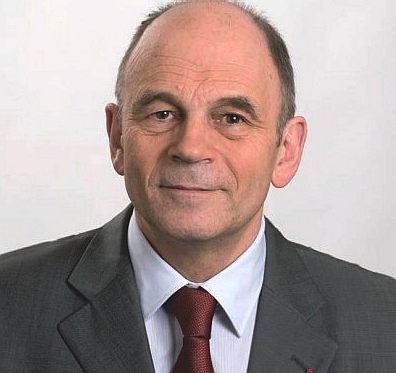
"I did not conquer the Pacific. It let me go across."
- GERARD D'ABOVILLE
On September 5, 1945, Gerard d’Aboville was born in Paris, the son of an aristocratic family linked to the history of France. As a child, he quickly displayed his passion for the sea and navigating. After completing his military service as a parachutist (from 1967 - 1968), he sets out to sea and circles the world on ships. From 1978 to 1980 he works on his project to cross the Atlantic ocean in a row boat. Rowing for 71 days and 23 hours, he covers the 5,200 kilometers which separate Cape Cod, in Newport, Massachusetts (USA) from Ouessant, Britany, (France). This solo crossing of the Atlantic, which took him from the 10th of July to the 21st of September 1980, won him numerous sports awards. In 1984, he took part in a long-distance river race along the waters of the Niger. In 1986 he’s off again to try his luck in motorcycle on the adventure-packed Paris-Dakar, and, a year later, it takes him 7 days to cover the distance between Hong Kong and Manila by catamaran. In 1991 it takes him 134 days to row solo across the Pacific ocean, setting off a 6 a.m. on the 11th of July from Choshi, a small fishing harbor 300 kilometers from Tokyo, and concluding his exploit on the 21st of December in Liwaco harbor, slightly to the north of Portland, Oregon (USA). Gerard is one of the founding trustees of the Ocean Rowing Society.
A L O N E - The Man Who Braved the Vast Pacific - and Won This is the incredible story of one heroic man's battle against almost impossible odds, a tale of
pain and anguish, of bravery and utter solitude, a tale that ends in his victory not only over the "enemy"-the implacable ocean- but also over himself Gerard d'Aboville was forty-five years old when he set out on his improbable mission: to row across the Pacific Ocean, from west to east, from Japan to the
United
States. He had already rowed across the Atlantic, from Cape Cod to the port of Brest, France. But that had been ten years before, when he was in the prime of life. Still, the nagging challenge of the Pacific - twice as vast as the Atlantic and several times as dangerous
- would not be denied. His rowboat, the Sector, was 26 feet long. The ocean was 6,200 miles wide. His watertight living compartment, a scant 31 inches high, contained a bunk, a one-burner stove, a ham
radio, and a telex (both powered by
solar panels). Fresh water came from two desalination pumps.
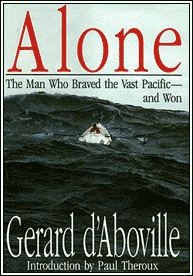
ALONE
- The book about an epic adventure After months of meticulous and often frustrating preparations, d'Aboville set out from Choshi, Japan, in mid-July, already several weeks behind schedule. He rowed ten to twelve hours a day - an average of 7,000 strokes per day - battled head-winds that pushed him backward or made him stand still (once for a frill two weeks),
cyclones with 100-miles-per-hour winds, and 40-foot
waves that hit him like can-nonballs and sent him hurtling into troughs 30 feet deep. His boat capsized more than thirty times; once he was trapped inside his hermetic cabin, upside down, for almost two hours, with the
oxygen almost depleted, before he managed to right the boat. Finally, 134 days after his departure, he came ashore at the little fishing village of Ilwaco, Washington. He was bruised and battered - and weighed thirty-seven pounds less - but truly un-bowed.
"I have chosen the ocean as my field of confrontation, my field of battle," writes d'Aboville, "because the ocean is reality at its toughest, its most demanding. As my weapons against this awesome power, I have
human values: intelligence,
experience, and the stubborn will to win."
Gerard d'Aboville was born and grew up in Brittany, France, where, in his words, he had always rowed "the way other chil-dren pedaled bicycles." He lives in France with his wife, Cornélia, and their two children, Ann and Guillaume.
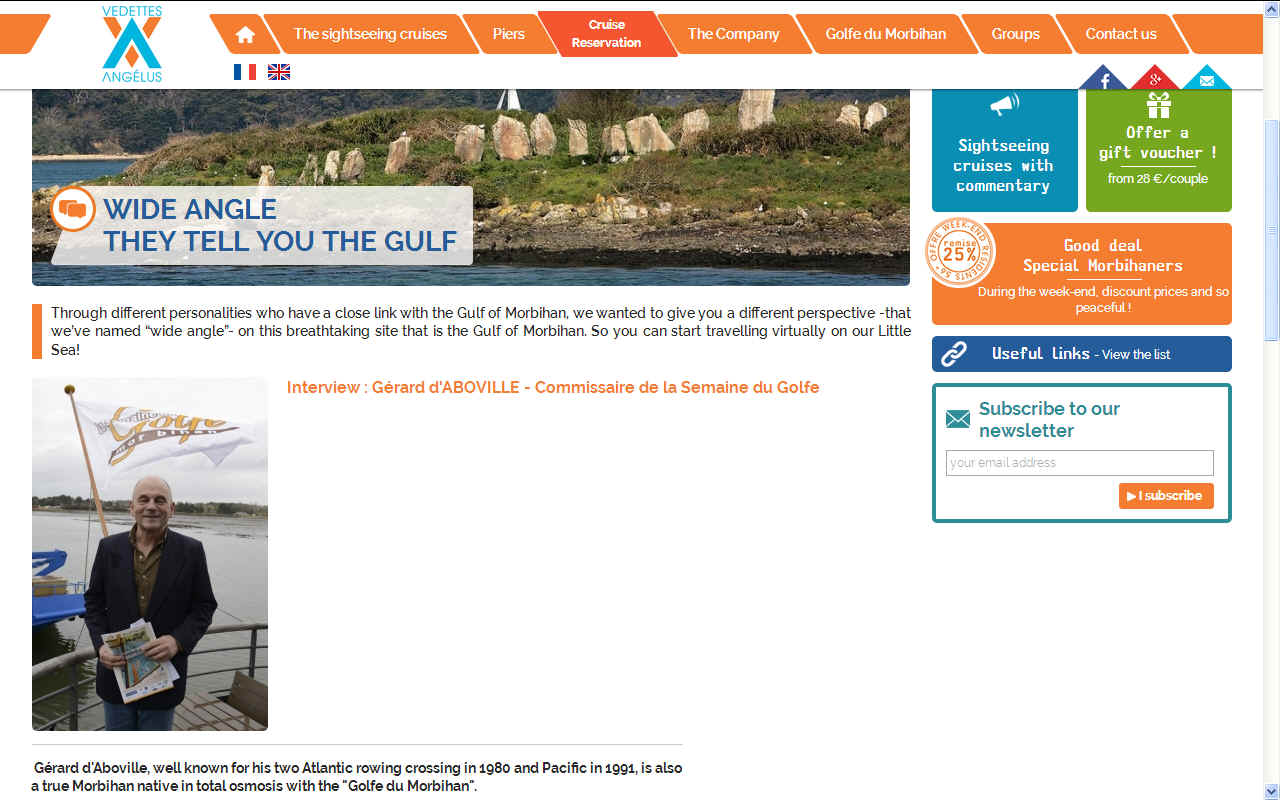
INTERVIEW
WITH: VEDETTES ANGELUS How do you explain your involvement in every edition of the Semaine du Golfe?
Following the Erika shipwreck in December 1999, a huge effort had been made both from the authorities and an army of volunteers to clean our shoreline that had been badly sullied.
In order not to add an economic downturn to the ecological disaster, we brainstormed about an event that would prove to all that the Morbihan had recovered its unspoilt environment.
It is then that a small team of enthusiasts came up with the idea of a big gathering of tall ships that was presented to the General Council. I had been involved in the coordination of the thousands of volunteers who helped cleaning the beaches and I was asked to be the General Commissioner for this event.
I’m in love with the Gulf where I started sailing, I also have a passion for the maritime heritage and as such, I am Chairman of a Foundation that aims for its preservation. I also own a classic sailboat built in 1907 that is a listed building and is probably the most ancient boat on the Gulf. For all these reasons, I accepted the offer with great enthusiasm.
What does the Gulf of Morbihan mean for you in terms of environment, sailing and personally?
The Gulf is where I started sailing when I was very young. This is where my passion for boats was born; it’s the place I was dreaming about when I found myself in difficult situations on faraway oceans. It’s important to have roots linked to a place, and what an exceptional place! The Gulf has everything: its natural sites, streams that make navigation a challenge, a rich historic heritage, megaliths that still hold many secrets and an ever changing scenery thanks to the tides…
What will be the highlights of the 2015 Gulf’s week?
The principle of the Gulf’s Week and what makes it unique is the navigation in different homogeneous flotillas. Each day, one flotilla leaves one of the ports on the Gulf to reach another one and in each port, volunteers (more than 2,000) compete to give the best welcome to the crews and the visitors ashore. Moreover, many spots on the coast allow watching closely the boats. Therefore, to me there are many highlights but surely the climax is the Big Parade on the Saturday with all the flotillas sailing together to enter the Gulf, each of them in the wake of an iconic tall ship. How many sailing boats will take part in 2015?
Quantity is not the objective of the organizers of the Gulf’s week. However because the event is successful, most of the participants come back once they’ve tried it. In spite of the early date in the sailing season, many foreign boats join in. From one edition to the next, we have a growing number of participants. At the beginning of March, almost 1,000 boats had registered, including around 50 British and more than 30 Dutch.
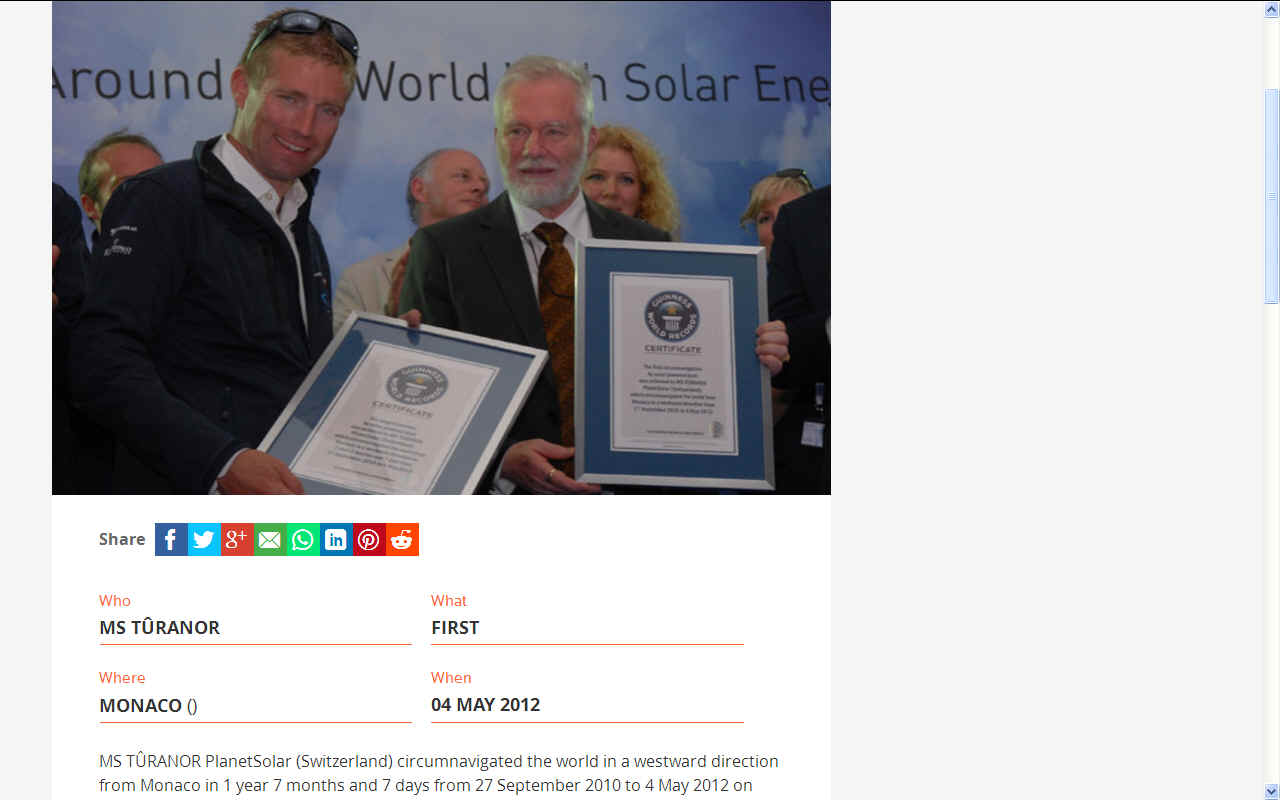
GUINNESS
RECORDS - Raphael Domjan and Immo Stroeher holding their world record
certificates.
TURANOR
PLANETSOLAR
There
are few people on earth who put their money where their mouths are, or who
appreciate the importance of changing our ways, and here we are talking
about continuing to burn fossil
fuels while our oceans burn. One
of those shining stars is Immo Stroeher, a German
industrialist and entrepreneur who in 2008 formed a partnership with
Raphael Domjan, a Swiss electrical engineer.
LINKS
& REFERENCE
https://www.vedettes-angelus.com/en/interview-gerard-daboville-commissaire-de-la-semaine-du-golfe http://www.europarl.europa.eu/meps/en/2202/GERARD_D'ABOVILLE/history/4 https://www.facebook.com/pages/G%C3%A9rard-dAboville/144216922262545 http://www.oceanrowing.com/Gerard_d_Aboville/ https://www.planetsolar.swiss/en/world-premiere/boat/
|



